|
|
|
|
The global pet trade is a multi-billion dollar business that moves tens of millions of animals around the globe annually. Some pets are released into the wild by their owners — or escape — and have a go at making it in their new home. Some, like the Burmese pythons released into the Florida Everglades decades ago, do a pretty good job of it, and new research finds that invasive ants may be the next pet to watch out for.
Today in The Conversation Canada, Megan Frederickson from the University of Toronto writes about invasive ants and the havoc they can cause. Yellow crazy ants, for example, have been blamed for savaging Christmas Island’s famous red crabs and decimating the wedge-tailed shearwater on the island of Oahu, in Hawaii. A new study finds invasive ants are widespread in the global pet trade.
Frederickson, who is a myrmecologist — someone who studies ants — also finds them fascinating. They make great pets, she says, but be careful, because they can also make great pests.
Also today:
Regards,
|
Hannah Hoag
Deputy Editor | Environment + Energy Editor
|

|
|
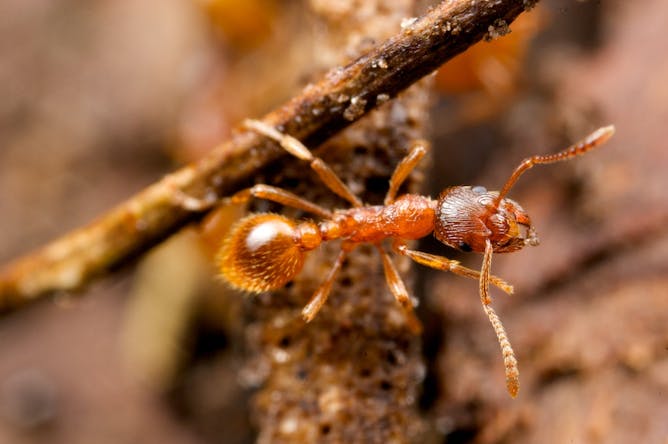
The European fire ant, Myrmica rubra, is one of the invasive ant species in Ontario. They are known for their painful sting.
(Jon Sanders)
Megan Frederickson, University of Toronto
Animals that are traded as pets are more likely to be invasive species, including a relatively new pet: ants.
|
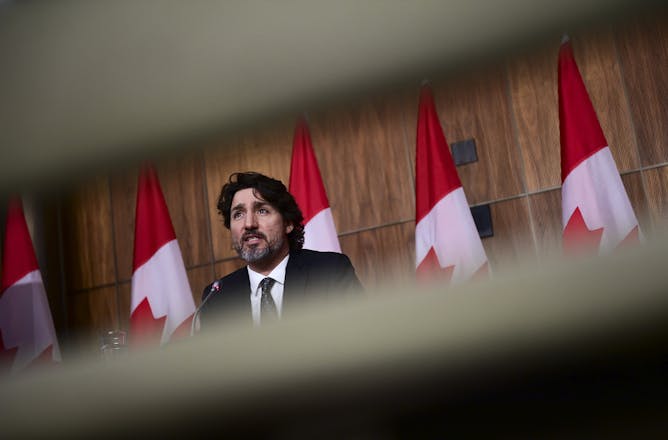
By identifying the need to tackle systemic discrimination instead of colonialism, Trudeau is reinforcing an established idea in Canadian politics: that colonialism is history.
THE CANADIAN PRESS/Sean Kilpatrick
Liam Midzain-Gobin, Brock University; Heather Smith, University of Northern British Columbia
Narratives that historicize colonialism are not new. Canadians and our leaders have a long history of denying our settler colonial present.
|
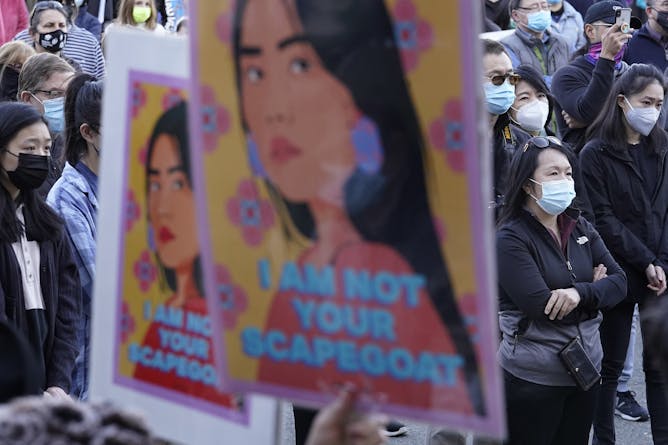
Protesters display placards during a rally held to support Stop Asian Hate, March 21, 2021, in Newton, Mass.
(AP/Steven Senne)
Jiyoung Lee-An, Carleton University; Xiaobei Chen, Carleton University
The invisibility of anti-Asian racism is inextricably connected to the model minority myth, which serves to disguise the violence experienced by Asian American and Asian Canadian women.
|
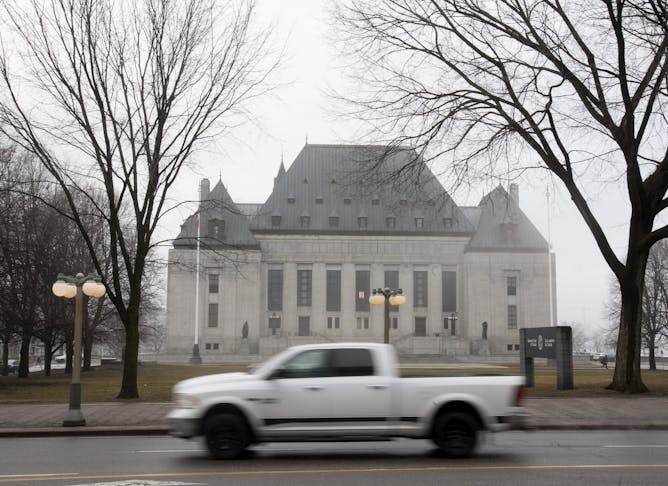
The Supreme Court of Canada rejected the request to strike down national carbon pricing. The plan is key to reaching net-zero emissions by 2050.
THE CANADIAN PRESS/Adrian Wyld
Nathalie Chalifour, L’Université d’Ottawa/University of Ottawa; David Robitaille, L’Université d’Ottawa/University of Ottawa
In its decision, the Supreme Court of Canada recognized the gravity of climate change and upheld the idea that Parliament has the authority to act on matters of "peace, order and good government."
|
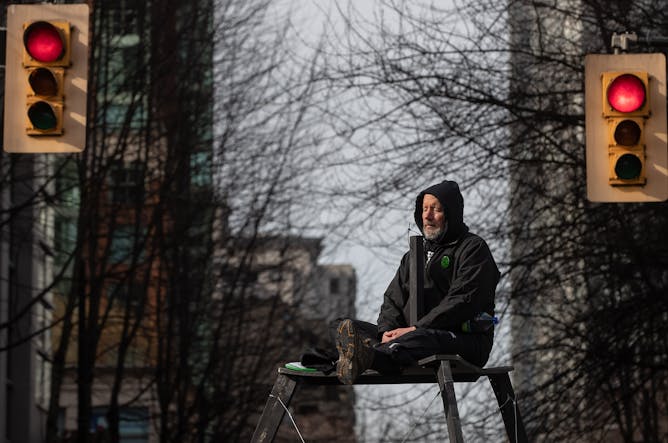
A person sits on a tripod platform high above the street as protesters occupy an intersection during a demonstration to call for government action to on climate change in Vancouver in February 2021.
THE CANADIAN PRESS/Darryl Dyck
Michael M. Atkinson, University of Saskatchewan; Haizhen Mou, University of Saskatchewan
As Canada emerges from the pandemic, creating jobs and achieving full employment are top priorities. Relegated to the back burner are balanced budgets and reducing debt.
|
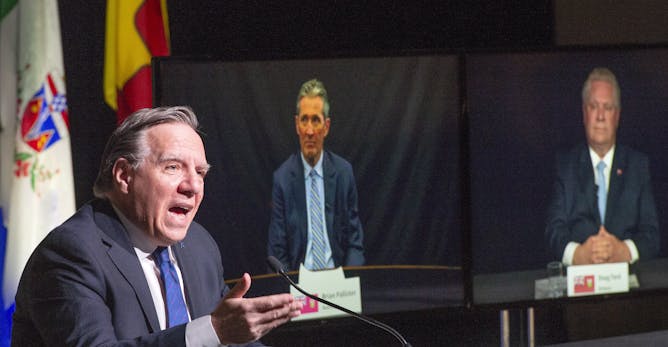
Québec Premier François Legault chairs a premiers virtual news conference as premiers Brian Pallister, Manitoba, and Doug Ford, Ontario, are seen on screen on March 4, 2021 in Montréal.
THE CANADIAN PRESS/Ryan Remiorz
Tom McIntosh, University of Regina
The premiers are demanding more funding from the federal government for health care. Yet more cash without real change would be the real betrayal of Canada's public health-care system.
|
La Conversation Canada
|

Des personnes âgées attendent leurs vaccins contre la Covid-19, le 1er mars, à Montréal. Les débuts de la campagne de vaccination ont été lents, mais les objectifs des gouvernements restent ambitieux. Sont-ils réalistes?
La Presse Canadienne/Ryan Remiorz
Lavagnon Ika, L’Université d’Ottawa/University of Ottawa; Gilles Paché, Aix-Marseille Université (AMU)
La campagne de vaccination contre la Covid-19 a débuté lentement au pays. Elle s’accélère, mais seul l’avenir nous dira si elle peut être qualifiée de succès.
|
Environment + Energy
|
-
Joe Blakey, University of Manchester; Jana Wendler, University of Manchester
These emissions aren’t factored into climate targets, and COVID recovery could make it worse.
|
|
Politics
|
-
Rob Ahearne, University of East London
Hassan may prove the right sort of politician to usher in a new era of bipartisan politics, less populist and authoritarian and more collegial.
|
|
COVID-19
|
-
Jeff Prince, Indiana University; Daniel Simon, Indiana University
People are ready to travel, but health officials are advising against air travel. A recent study offers a surprising finding about whether planes spread COVID-19 from US hot spots last year.
|
|
| |
| |
| |
| |
| |
| |
|
|
|
|
|
|
|